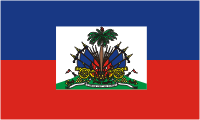Vote count starts immediately after huge turnout in Haiti elections
Waiting in lines until nightfall, Haitians cast ballots by candlelight to elect a new president and parliament in a vote deemed vital to averting a political and economic meltdown in the Western Hemisphere 's poorest nation.

The nation's electoral council said early results would not be available until late Wednesday, leaving this impoverished nation waiting anxiously to find out who will be its next leader, or whether a second-round presidential vote is needed.
Two years ago, a bloody revolt ousted then-President Jean-Bertrand Aristide and plunged Haiti into chaos.
The elections on Tuesday, held under the watch of a 9,000-strong U.N. peacekeeping force, were hailed by officials as a success despite delays that caused many polls to open late.
Rene Preval, a 63-year-old agronomist who led Haiti from 1996-2001, was the front-runner among 33 presidential candidates. Preval, who enjoys wide support among Haiti 's poor, is a one-time ally of Aristide, who is in exile in South Africa after the revolt.
Many voting sites were chaotic after opening, and some opened late. They lacked the necessary election workers, security and ballots to handle the crush of voters who arrived by foot, car and brightly colored "tap-tap" buses.
Lines stretching up to a kilometer (mile) snaked out of some polling stations. Voters clutching new electoral ID cards jostled and shouted for ballots. Some fainted and were carried away.
"People were yelling and screaming to get inside the voting booths," said Mona Joseph, 21, one of the last people to vote. She said she had to go to several different polling centers in the capital before finding her name on the voter registry.
Jose Miguel Insulza, the head of the Organization of American States, said "a large majority of the Haitian population voted," although no specific numbers were available.
"We will have a democratic government ... that this country has fought so long and hard to have," Insulza told reporters Tuesday night.
Acting U.S. Ambassador Timothy Carney applauded Haitians for stepping up to determine their future.
"Today was a triumph for the Haitian people," he said. "It was a ragged start. The Haitian people turned out in force, clearly believing security was in place. They made it work. They waited in line patiently."
U.N. peacekeepers deployed in larger numbers and polling workers ironed out the early morning problems. Election officials extended voting by several hours to ensure those who wanted to vote could.
By nightfall, hundreds of people were still lined up at a polling station near Cite Soleil, a vast, seaside slum ruled by gangs. Among them was Rene Valmay, a 25-year-old Cite Soleil resident voting in his first election.
He arrived to vote at 6 a.m. but left when his voting station failed to open more than three hours after the election's official start. The delay sparked a frenzy among 5,000 waiting voters, who pounded on empty ballot boxes and chanted: "It's time for Cite Soleil to vote!"
"It was crazy, but I had to come back and vote," Valmay said as fellow voters scribbled on ballots under the flicker of candles. "Hopefully, tomorrow I'll wake up and there will be a change in Haiti ."
If no candidates wins a majority, the top two vote-getters will face off in a March 19 runoff. Fuller results were expected later in the week.
At least four deaths were reported, but officials said the vote was largely free of violence.
In the northern town of Gros Morne , a Haitian policeman shot and killed a man in line at a polling station, said David Wimhurst, a U.N. spokesman. A mob then killed the police officer, he said. There were two other reported deaths in polling stations in the capital two elderly men who collapsed while waiting in line.
Experts say the elections are crucial to pulling Haiti from a seemingly endless cycle of misery and despair. Following Aristide's ouster, gangs have gone on a kidnapping spree and the country's few factories are closing causing thousands of layoffs because of security problems and a lack of foreign investment.
Other top contenders among the 33 presidential candidates are Charles Henri Baker, 50, whose family runs factories that assemble clothing for export, and Leslie Manigat, 75, who was president for five months in 1988 until the army ousted him, reports the AP.
D.M.
Subscribe to Pravda.Ru Telegram channel, Facebook, RSS!





